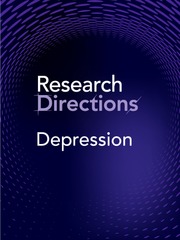Context
One of the areas of greatest public interest is whether altering your diet can reduce your risk of developing depression and whether there are any dietary manipulations that are effective treatments for depression? Many epidemiological studies have suggested associations between lower rates of depression and specific dietary types (e.g., Mediterranean, ‘anti-inflammatory’, Keto, low carbohydrate and Fish oil-rich) (Dietch et al., Reference Dietch, Kerr-Gaffney, Hockey, Marx, Ruusunen, Young, Berk and Mondelli2023). These epidemiological data are buttressed by post hoc analyses of several large-scale clinical trials with other primary outcomes – the PREDIMED study being an exemplar (Sánchez et al., Reference Sánchez-Villegas, Martínez-González, Estruch, Salas-Salvadó, Corella, Covas, Arós, Romaguera, Gomez-Gracia, Lapetra and Pinto2013). In addition, the first generation of randomised controlled trials is now available suggesting that a healthier diet pattern especially the Mediterranean diet reduces the symptoms of depression in clinical populations (Jacka et al., Reference Jacka, O’Neil, Opie, Itsiopoulos, Cotton, Mohebbi, Castle, Dash, Mihalopoulos, Chatterton, Brazionis, Dean, Hodge and Berk2017).
While positive these studies are yet to be replicated by very large definitive independent clinical trials. And there are many unanswered questions including whether specific dietary patterns like the Mediterranean diet are equivalent to other traditional non-Western diet patterns, and whether the presence of large quantities of ultra-processed foods can be offset by greater intake of notionally beneficial food groups or patterns. Lastly, given the great difficulty in the obesity literature in sustaining behavioural change, translational strategies, interdigitation with clinical care and sustainability remain unanswered issues (Berk & Jacka, Reference Berk and Jacka2019).
The use of various dietary manipulations (increased phytochemicals, omega-3 fatty acids, folate, low carbohydrate, prebiotics and probiotics, increased fibre, increased monosaturated fats, and supplementation with tree nuts) as potential primary or adjunctive treatments for depressive disorders is also an area of feverish activity. It remains highly uncertain whether adjunctive single-nutrient strategies can counteract an otherwise unhealthy diet, with several recent clinical trials of supplements being disappointing (Amminger et al., Reference Amminger, Rice, Davey, Quinn, Hermens, Zmicerevska, Nichles, Hickie, Incerti, Weller, Joseph, Hilton, Pugh, Rayner, Reid, Ratheesh, Yung, Yuen, Mackinnon, Hetrick, Parker, Street, Berger, Berk, McGorry and Lin2023; Sarris et al., Reference Sarris, Byrne, Stough, Bousman, Mischoulon, Murphy, Macdonald, Adams, Nazareth, Oliver, Cribb, Savage, Menon, Chamoli, Berk and Ng2019). The role of the microbiome remains of great interest including the translation or potential of prebiotic probiotic and faecal microbiome transplantation strategies (Green et al., Reference Green, Berk, Mohebbi, Loughman, McGuinness, Castle, Chatterton, Perez, Strandwitz, Athan, Hair, Nierenberg, Cryan and Jacka2023; McGuinness et al., Reference McGuinness, Davis, Dawson, Loughman, Collier, O’Hely, Simpson, Green, Marx, Hair, Guest, Mohebbi, Berk, Stupart, Watters and Jacka2022). The available preliminary data for these remain to be definitively confirmed.
At times, it has been suggested that specific nutrient or dietary pattern factors are more relevant to particular subgroups in the population (e.g., children during development and older people), those with specific genetic characteristics (e.g., folate supplementation in those with different genetic determinants of homocysteine metabolism) or those with other relevant comorbid health factors (e.g., particularly obesity, autoimmune disorders and gut absorption abnormalities). Some would suggest that dietary factors are only really relevant to those with other clearly documented abnormalities, such as gluten intolerance. These questions remain largely unanswered.
So, what do we really know about dietary factors and depression? How large are these effects? Are they limited to specific subgroups – such as young people, or those with poor baseline diet? How poor does a diet have to be to be clinically meaningful, and what are the measurable elements? Are the effects of dietary changes really dependent on what is happening in the gut, and particularly the bacterial flora of the gut (the unique microbiome), in each person? By which specific regulatory (e.g., immune, HPA axis and neurogenesis) or biochemical (e.g., tryptophan-Kynurenine and Brain Derived Neurotrophic Factor) pathways might these effects be mediated? (Marx et al., Reference Marx, Lane, Hockey, Aslam, Berk, Walder, Borsini, Firth, Pariante, Berding, Cryan, Clarke, Craig, Su, Mischoulon, Gomez-Pinilla, Foster, Cani, Thuret, Staudacher, Sánchez-Villegas, Arshad, Akbaraly, O’Neil, Segasby and Jacka2021) What is the interaction between diet and other lifestyle factors such as trauma and physical activity? How does one engender sustained behavioural change in a population that is often demotivated as part of their core difficulties? And how does one embed lifestyle medicine into the very complex and rigid framework of routine clinical care? These amongst many others are the issues facing this field, and the aim of this collection is to publish narrative, systematic and meta-analytic reviews that shed light on any of these issues as well as original research.
How to contribute to this Question
If you believe you can contribute to answering this Question with your research outputs, find out how to submit in the Instructions for authors (https://www.cambridge.org/core/journals/research-directions-depression/information/author-instructions/preparing-your-materials). This journal publishes Results, Analyses, Impact papers and additional content such as preprints and ‘grey literature’. Questions will be closed when the editors agree that enough has been published to answer the Question so before submitting, check if this is still an active Question. If it is closed, another relevant Question may be currently open, so do review all the open Questions in your field. For any further queries check the information pages (https://www.cambridge.org/core/journals/research-directions-depression/information) or contact this email ([email protected]).
Competing interests
IBH is the Co-Director, Health and Policy at the Brain and Mind Centre (BMC) University of Sydney, Australia. The BMC operates an early-intervention youth services at Camperdown under contract to headspace. Professor Hickie has previously led community-based and pharmaceutical industry-supported (Wyeth, Eli Lily, Servier, Pfizer, AstraZeneca and Janssen Cilag) projects focused on the identification and better management of anxiety and depression. He is the Chief Scientific Advisor to, and a 3.2% equity shareholder in, InnoWell Pty Ltd which aims to transform mental health services through the use of innovative technologies. MB is supported by a NHMRC Senior Principal Research Fellowship and Leadership 3 Investigator grant (1156072 and 2017131) MB: Grant/Research Support: MRFF, NHMRC, Congressionally Directed Medical Research Programs (CDMRP) USA, AEDRTC Australian Eating Disorders Research and Translation Centre, Patient-Centered Outcomes Research Institute (PCORI), Baszucki Brain Research Fund, Danmarks Frie Forskningsfond. Psykiatrisk Center Kobenhavn, Stanley Medical Research Institute, Victorian Government Department of Jobs, Precincts and Regions, Wellcome Trust, Victorian Medical Research Acceleration Fund, Controversias Psiquiatria Barcelona, CRE, Victorian COVID-19 Research Fund, Consultancies: Lundbeck, Sandoz, Servier, Medisquire, HealthEd, ANZJP, EPA, Janssen, Medplan, RANZCP, Abbott India, ASCP, International Society of Bipolar Disorder, Precision Psychiatry, Penn State College of Medicine, Shanghai Mental Health Centre.





